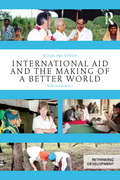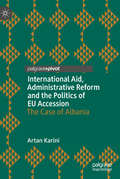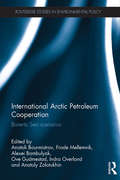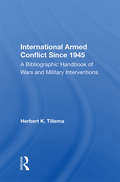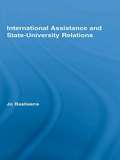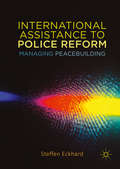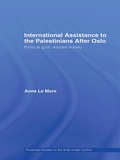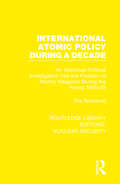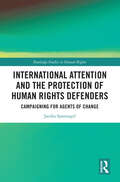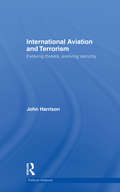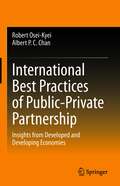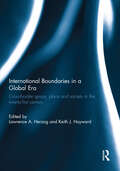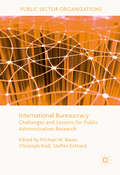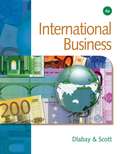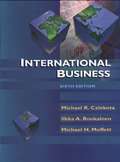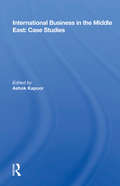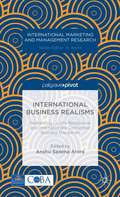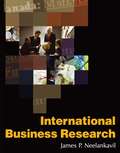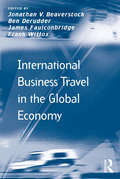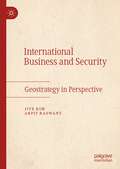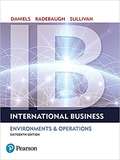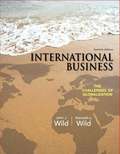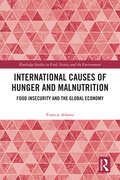- Table View
- List View
International Aid and the Making of a Better World: Reflexive Practice (Rethinking Development)
by Rosalind EybenHow can international aid professionals manage to deal with the daily dilemmas of working for the wellbeing of people in countries other than their own? A scholar-activist and lifelong development practitioner seeks to answer that question in a book that provides a vivid and accessible insight into the world of aid – its people, ideas and values against the backdrop of a broader historical analysis of the contested ideals and politics of aid operations from the 1960s to the present day. Moving between aid-recipient countries, head office and global policy spaces, Rosalind Eyben critically examines her own behaviour to explore what happens when trying to improve people’s lives in far-away countries and warns how self-deception may construct obstacles to the very change desired, considering the challenge to traditional aid practices posed by new donors like Brazil who speak of history and relationships. The book proposes that to help make this a better world, individuals and organisations working in international development must respond self-critically to the dilemmas of power and knowledge that shape aid’s messy relations. Written in an accessible way with vignettes, stories and dialogue, this critical history of aid provides practical tools and methodology for students in development studies, anthropology and international studies and for development practitioners to adopt the habit of reflexivity when helping to make a better world.
International Aid, Administrative Reform and the Politics of EU Accession: The Case of Albania
by Artan KariniThis book provides a detailed analysis of the dimensions and dynamics of the role of international aid in the reform and capacity development of public service in post-communist Albania. It challenges the technocratic, results-based management frameworks used by aid organizations and reports of official donors operating in the country context, and offers a qualitative and critical assessment of the role of aid in administrative reform and capacity building. Secondly, the book highlights the specificity of the national politico-administrative context and its ability to modify the process of policy transfer from aid organizations to the Albanian bureaucracy. In doing so, it illustrates the domestic challenges in the transfer process towards policy learning and makes a valuable contribution to the debate over the (voluntary vs. coercive) administrative reform in Southeast Europe in relation to the politics of EU accession.
International Arctic Petroleum Cooperation: Barents Sea Scenarios (Routledge Studies in Environmental Policy)
by Indra Overland Anatoli Bourmistrov Frode Mellemvik Alexei Bambulyak Ove Gudmestad Anatoly ZolotukhinThe Arctic region contains large amounts of natural resources considered necessary to sustain global economic growth, so it is unsurprising that it is increasingly susceptible to political, economic, environmental, and even military conflicts. This book looks in detail at the preconditions and outlook for international cooperation on the development of Arctic petroleum resources, focusing on Norwegian–Russian cooperation in the Barents Sea towards 2025. The authors provide a cross-disciplinary approach including geopolitical, institutional, technological, corporate and environmental perspectives to analyse the underlying factors that shape the future development of the region. Three future scenarios are developed, exploring various levels of cooperation and development influenced by and resulting from potential political, commercial and environmental circumstances. Through these scenarios, the book improves understanding of the challenges and opportunities for Arctic petroleum resource development and promotes further consideration of the possible outcomes of future cooperation. The book should be of interest to students, scholars and policy-makers working in the areas of Arctic studies, oil and gas studies, energy security, global environmental governance, environmental politics and environmental technology.
International Armed Conflict Since 1945: A Bibliographic Handbook Of Wars And Military Interventions
by Herbert K. TillemaInternational Armed Conflict Since 1945 is a bibliographic handbook that briefly describes each of 269 international wars and other war-threatening conflicts occurring between 1945 and 1988. .
International Assistance and State-University Relations (Studies in Higher Education)
by Jo BastiaensThis book explores the goals, efforts and outcomes of international assistance to higher education over the past three decades and investigates how these have impacted changing State-university relations. Focusing on the case study of Indonesia, Bastiaens demonstrates how international aid facilitated and at times actively encouraged changing patterns of state-university relations from state control towards greater institutional autonomy. Through the use of various case studies from throughout the country and critical analysis of the relationships between international donors and domestic reformers, Bastiaens shows how the educational system of Indonesia was able to diversify resources, generate income, and become increasingly autonomous from government.
International Assistance to Police Reform
by Steffen EckhardThis book comparespolice reform operations in Kosovo and Afghanistan, addressing the internalmachinery that makes peace operations work--or not. Recognizing that the chancesfor effective peacebuilding vary widely across contexts, this book investigatesthe impact of one of the few variables that peacebuilders do control: themanagement and design of peace operations. Building on fieldresearch and over one hundred expert interviews, Internationalassistance to police reform: Managing Peacebuilding systematically compares such operations in twodifferent contexts--Kosovo and Afghanistan--by focusing specifically oninternational assistance for local police reform since 1999. Four comprehensivecase studies examine operations in Kosovo and Afghanistan before and after theEuropean Union took over police reform responsibilities: in Kosovo from the Organization for Security and Co-operationin Europe (OSCE) and in Afghanistan from the German government. Speaking toscholars and practitioners in domestic and international organizations, the bookdrills in the complex relation between headquarter diplomats and field levelconflict experts. Its findings combine to a set of recommendations forpolicy-makers to better align their operations to the contentious politics ofconflict management and peacebuilding.
International Assistance to the Palestinians after Oslo: Political guilt, wasted money (Routledge Studies on the Arab-Israeli Conflict)
by Anne Le MoreWhy has the West disbursed vertiginous sums of money to the Palestinians after Oslo? What have been donors’ motivations and above all the political consequences of the funds spent? Based on original academic research and first hand evidence, this book examines the interface between diplomacy and international assistance during the Oslo years and the intifada. By exploring the politics of international aid to the Palestinians between the creation of the Palestinian Authority and the death of President Arafat (1994-2004), Anne Le More reveals the reasons why foreign aid was not more beneficial, uncovering a context where funds from the international community was poured into the occupied Palestinian territory as a substitute for its lack of real diplomatic engagement. This book also highlights the perverse effects such huge amounts of money has had on the Palestinian population and territory, on Israeli policies in the occupied Palestinian territory, and not least on the conflict itself, particularly the prospect of its resolution along a two-state paradigm. International Assistance to the Palestinians after Oslo gives a unique narrative chronology that makes this complex story easy to understand. These features make this book a classic read for both scholars and practitioners, with lessons to be learned beyond the Israeli-Palestinian conflict
International Atomic Policy During a Decade: An Historical-Political Investigation into the Problem of Atomic Weapons During the Period 1945-1955 (Routledge Library Editions: Nuclear Security)
by Elis BiörklundOriginally published in 1956, atomic policy overshadowed political considerations in the same way that ‘the balance of power’ had mesmerized European politicians for so long. Admiral Biorklund here makes a general survey of the whole problem. He traces the development of the atom and hydrogen bombs and the history of international atomic policy as revealed by post-war conferences, by official statements, and in official and unofficial publications. His thirty years study of Russia and complete command of the language have enabled him to give a more thorough and authoritative account of the Soviet attitude than has so far appeared in English. He also presents fully the American point of view that the preservation of force is vital to the democracies of the world. Admiral Biorklund makes an expert contribution to a full appreciation of the primary question of the day. He feels that it is unrealistic to attempt a total prohibition of atomic weapons. But it is not therefore necessary to sit with folded arms. By starting with what is politically possible now, he outlines a solution which recognizes that the smaller tactical weapons would have to be tolerated while the heaviest bombs are strictly controlled. Clearly written, his book is extremely readable and of absorbing interest. It presents, soberly and objectively a great deal of information in a readily assimilable form. A large map (available online) plots the position of the world’s fissile material (uranium, thorium, lithium, etc.). Assessing every known scrap of information, it has been the most complete map yet published.
International Attention and the Protection of Human Rights Defenders: Campaigning for Agents of Change (Routledge Studies in Human Rights)
by Janika SpannagelThis book uses a practice-driven and empirically founded approach to address the question of whether and how international attention can protect and enable domestic human rights activists in authoritarian settings. It examines the untold origin story of the ‘human rights defender’ term and its uptake among international advocacy organizations, which coalesced with the rise of a theory of human rights change centered around the support for local actors. Rich with analyses of original qualitative and quantitative data, the author spells out this theory of change and tests its assumptions in two case studies: the individual casework of the UN special procedures, and the case of Tunisia under Ben Ali. This book is of key interest to scholars and students of human rights, of the United Nations, and more broadly of international relations and politics in general, and to practitioners working with human rights defenders at risk.
International Authority and the Responsibility to Protect
by Anne OrfordThe idea that states and the international community have a responsibility to protect populations at risk has framed internationalist debates about conflict prevention, humanitarian aid, peacekeeping and territorial administration since 2001. Anne Orford situates the 'responsibility to protect' concept in a wider historical and jurisprudential context, demonstrating that the appeal to protection as the basis for de facto authority has emerged at times of civil war or revolution - the protestant revolutions of early modern Europe, the bourgeois and communist revolutions of the following centuries and the revolution that is decolonisation. This history, from Hobbes to the UN, of the resulting attempts to ground authority on the capacity to guarantee security and protection is essential reading for all those seeking to understand, engage with, limit or critique the expansive forms of international rule authorised by the responsibility to protect concept.
International Aviation and Terrorism: Evolving Threats, Evolving Security (Political Violence)
by John HarrisonThis book examines terrorism's impact on the international aviation security regime, with a focus on the role of the United States. Tracing the historical development of the international civil aviation system, the volume examines how it has dealt with the evolving security environment caused by international terrorism. It begins by exploring the practical implications of the debates over the meaning of 'terrorism' and how the international civil aviation community developed practical solutions to avoid the debilitating debates over the concept while crafting important, if weak, international conventions. As a major civil aviation power, the United States was a predominant influence in security developments in the 1960s and 1970s, yet US civil aviation policy failed to keep pace with the changing nature of the terrorist threat. The commanding position that the United States maintains in international civil aviation provides a microcosm of the promise and perils faced by the world's sole superpower. The author examines US efforts to upgrade civil aviation security in the wake of 9/11 and the impacts of these developments on the international civil aviation system. The detailed discussion of terrorism past and present places the threat in its proper context for both the international civil aviation community and its largest individual actor, the United States. This book will be of much interest to students of terrorism, aviation security, international security and IR in general. John Harrison is an Assistant Professor at the S.Rajaratnam School of International Studies and Head of Terrorism Research at the International Center for Political Violence and Terrorism Research.
International Best Practices of Public-Private Partnership: Insights from Developed and Developing Economies
by Albert P. Chan Robert Osei-KyeiThis book discusses how Public-Private Partnership (PPP) is practiced in developed and developing economies. The book demonstrates how PPP as a concept has grown over the years with many governments particularly from developing economies/countries seeking to enhance infrastructure growth and development through this scheme. Further, the book explores how PPP has become the major infrastructure procurement policy adopted by many governments globally to address the rapid increase in demand for infrastructure due to the increase in population growth. Although, there are many available textbooks on PPP, this book is unique because it provides in-depth analysis and discussion on the international best practices of PPP from developed and developing economies perspectives. This book provides strategic measures, useful practices and information about the similarities and differences in PPP practices in developed and developing economies based on empirical evidence and case studies. This book is structured in nine chapters. The first chapter explores the basic concept of PPPs. The second chapter looks at the global development and practices of PPP particularly from developed and developing economies’ perspectives. The third to the eight chapters explores critical topics and issues in international PPP practices from developed and developing economies perspectives. The topics included in this book are: governments motivations for adopting PPPs, barriers to PPP implementation, measuring PPP project success, risk management in PPPs, causes of conflict and conflict resolution mechanisms in PPPs and management of unsolicited proposals. The ninth chapter presents a comprehensive best practice framework for implementing international PPP projects. This book is useful to undergraduate and postgraduate students in architecture, civil engineering, business, construction and project management, researchers interested in PPP topics, international investors and financiers, public authorities and departments and international development banks. This book provides in-depth insights and understanding on the best practices for PPP from the international perspective especially from the viewpoint of countries with diverse culture and policies. Importantly, readers will be adequately informed of the similarities and differences of PPP practices and processes in developed and developing economies based on empirical evidence. Investors and governments will be informed of the strategic plans and preventive actions to employ when engaging in PPP arrangements in any part of the world.
International Boundaries in a Global Era: Cross-border space, place and society in the twenty-first century
by Lawrence A. Herzog and Keith J. HaywardAs we move deeper into the twenty-first century, the forces of globalisation continue to transform both the spaces around international borders, and the social processes, cultural practices, economies, and political dynamics within and between these spaces. The geographies of border regions have undergone a dramatic transformation over the last half century; nation-state boundaries growing ever more porous in many (though not all) areas of the planet. Global trade has become an accepted norm in business transactions almost everywhere. Coupled with the revolution in digital technology, the era of globalisation promises to continue to challenge old ideas, with new approaches to understanding international boundaries and the regions they impact. All of the chapters in this book, mainly drawn from the US-Mexico border (with comparisons to Europe), speak to the ways in which border regions have become important places in their own right, spaces where people live, work, and create art, where corporations invest, where crimes occur, and where security remains a concern. They are, therefore, spaces that need to be better understood and managed, especially in light of the cross-national and global forces impinging upon them. This book was originally published as a special issue of Global Society.
International Bureaucracy
by Christoph Knill Steffen Eckhard Michael W. BauerThis book applies established analytical concepts such as influence, authority, administrative styles, autonomy, budgeting and multilevel administration to the study of international bureaucracies and their political environment. It reflects on the commonalities and differences between national and international administrations and carefully constructs the impact of international administrative tools on policy making. The book shows how the study of international bureaucracies can fertilize interdisciplinary discourse, in particular between International Relations, Comparative Government and Public Administration. The book makes a forceful argument for Public Administration to take on the challenge of internationalization.
International Business (4th Edition)
by Les Dlabay James Calvert ScottInternational Business 4E provides students with the attitudes, knowledge, and skills for entry-level international business and marketing occupations. Content includes political, legal, financial, economic and social/cultural considerations. Students will be able to understand and compare the way in which business and marketing is conducted domestically versus internationally. The text covers real-world applications, projects, technology, ethics, and cross-curricular links. Students will find the communication sections particularly useful in helping them prepare international communication and trade documentation. The technology coverage from a global perspective helps students research and prepare interactive multimedia presentations.
International Business (Sixth Edition)
by Michael H. Moffett Ilkka A. Ronkainen Michael R. CzinkotaThis text addresses itself to the issues involved in doing business abroad. It includes theory and research, some basic geography and culture, suggestions for even the small companies to use technology to reach other countries, and more.
International Business In The Middle East: Case Studies
by Ashok KapoorThis book, designed for academic and business communities, discusses the dimensions of business development in the Middle East. It identifies distinguishing features, calls for attention to the human resources needs of an operation and the special requirements of host governments.
International Business Realisms: Globalizing Locally Responsive and Internationally Connected Business Disciplines
by Anshu Saxena AroraInternational Business (IB) is a complex and interdisciplinary field. It encompasses regular currency and political risks alongside fundamental uncertainties and variations in international development, collaboration, social values, and shared objectives. As globalization expands our markets across national boundaries, institutional innovation and experimentation is essential for countries to brand their products globally and develop internationally acclaimed products. The contributors of International Business Realisms analyze instances of interdisciplinary marketing and branding for the global market place and distill practical implications for effective international and domestic marketing.
International Business Research
by James P. NeelankavilAs more and more companies enter the global business arena, it is critical that they acquire relevant information specific to their industry and the country that they wish to enter. This book explains how to perform accurate, timely, and appropriate research to make informed strategic decisions. The chapters of "International Business Research" follow the overall research process - defining the research problem, explanation of research methodologies, data analysis, report writing and dissemination. The book presents methodologies for most functional areas and can be used as a research tool for the broad international business field. It includes in-chapter learning objectives, exercises, summaries, boxed inserts, and a detailed glossary. In addition, a sample data disk is bound into each copy of the book.
International Business Travel in the Global Economy
by Ben Derudder Frank WitloxBusiness travel has become indispensable to the global economy, not only due to its necessity in the maintaining of corporate networks, but also because of the associated economies that cater to the daily requirements of the business traveller. Underlying these developments are concerns over the environmental impact of increasing air travel, which are likely to generate new challenges for the future of business travel. From a team of international experts comes this analysis of the role, nature and effects of modern business travel. Issues addressed include the relationships between airlines and business travellers, the role of mobility in business, and the opportunities and challenges created by mobile workforces. The study combines theoretical advances with comprehensive analysis, and will provoke debate across the social sciences on the nature, organization and space of work in the twenty-first century.
International Business and Political Economy
by Dipak Basu Victoria MiroshnikThis book is divided up into three sections. The first deals with the problem of the World economy and the most important issues affecting the World economy. The second analyses problem mainly affecting the developed countries. The third analyses the issues in the developing countries particularly in the BRIC countries.
International Business and Security: Geostrategy in Perspective
by Jiye Kim Arpit RaswantIn the context of intensifying nationalism and protectionism and a reconfiguration of the global value chains, the world’s leading economies find themselves confronted with significant challenges. To address these issues, this book builds on conceptual and empirical analysis and makes a case for interdisciplinary research that connects International Business (IB) and International Security (IS) domains. Employing the concept of geostrategy and using multi-level approaches to explain the interaction among various players in IB and IS, the authors examine the implications that IB and IS disciplines provide to each other. This book is a valuable resource for students and researchers interested in international business, international relations, international security, and international political economy and answers the growing call for an interdisciplinary research approach to promoting critical thinking in the rapidly evolving international business and security environment.
International Business: Environments and Operations (16th Edition)
by John D. Daniels Lee H. Radebaugh Daniel P. SullivanBalancing authoritative theory and meaningful practice, International Business engages readers on the subject of conducting business in international markets. The authors' descriptions and ideas of international business are enhanced with contemporary examples, scenarios, and cases that help readers effectively apply what they've learned. Now in its 16th Edition, International Business remains one of the best-selling and most authoritative international business texts available. As rigorous and practical as ever, this edition remains current through updated author- written cases, including seven entirely new cases, streamlined writing, and expanded coverage of relevant global changes.
International Business: The Challenges of Globalization
by John J. Wild Kenneth L. WildDirected primarily toward undergraduate International Business majors, this text also provides practical content for future industry professionals. A readable, concise, and innovative tour through international business,this text presents the subject matter in a comprehensive - yet succinct - framework. Real-world examples and engaging features bring concepts to life and make international business accessible to all. The Seventh Edition better explains the influence of the global credit crisis and recent recession on international business, and even more fully embraces the crucial role of emerging markets in today's global economy.
International Causes of Hunger and Malnutrition: Food Insecurity and the Global Economy (Routledge Studies in Food, Society and the Environment)
by Francis AdamsThis book examines the international causes of hunger and malnutrition and reveals how critical elements of the global economy heighten food insecurity in the developing world.At present, over two billion people in the developing world do not have secure access to safe, sufficient, and nutritious food. With the global population projected to rise to almost 10 billion by 2050, ensuring universal access to food will become increasingly urgent. The global community will need to redouble its efforts to effectively address the underlying causes of food insecurity. Within countries, a number of causes – poverty, poor governance, civil conflict, environmental decline - are immediately apparent and must be addressed to have any hope of lessening hunger and malnutrition. At the same time, a number of other factors well beyond national borders often constitute equal or greater obstacles to meeting the nutritional needs of all people. These factors are not nearly as visible and are largely outside the control of individual countries and local communities. This book examines how core elements of the global economy cause, prolong, and intensify food insecurity in the developing world. Emphasis is placed on agricultural trade, seed privatization, transnational land acquisitions, industrial fishing, and climate change. Understanding how these five factors impact the poorest communities in the poorest countries is essential for constructing an equitable, inclusive, and sustainable global food system that meets the nutritional needs of all people. By highlighting five major international causes of hunger and malnutrition, this book offers an alternate framework for understanding and combatting global food insecurity.This book will be of particular interest to students, scholars, and practitioners in the fields of global food security, international development, and global political economy.
